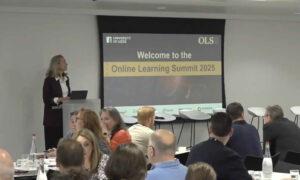A few weeks ago I was lucky enough to be in Leeds for the second Online Learning Summit #OLS25 helmed by the brilliant Margaret Korosec, who delivered an even more stellar line-up of speakers and panel participants than we enjoyed at the excellent 2023 event. I had hoped to launch into another series of reflective blogs about it, but then my dad had a stroke and a close friend was suddenly hospitalised and life segued into a blur of cross-country travel and hospital visits.
While I slowly emerge from all that I’m still keen to reflect on the learning I got from the conference, but I’m finding that intervening events are putting a slightly different slant on things for me.
As the conference opened, Masud Khokar talked about online learning being in a liminal space. He was talking about the rapid changes in the technology and broader HE environments, especially with regard to AI, but there’s nothing like a sudden, jarring shift into “parenting the parent” to bring the understanding of being in a liminal space into sharp focus. A whole new normal has to be found, and until it is, nobody really has a grip on what is going on. It’s not unreasonable to suggest that that is where some of online learning is at the moment, and yet as we saw across two inspiring days, it’s definitely not where all of it is!
We were treated to a tour de force as an opening plenary, with the protagonists of the Online Education Across the Atlantic podcast – Phil, Morgan and Neil – ostensibly covering the state of online HE in the UK and US but actually delivering nugget after nugget of vital insight. Some of the numbers were fascinating – for example Neil told us there are only seven UK universities running courses with more than 1000 students. That to me speaks of enormous untapped potential here. And Morgan, reviewing the US where all the numbers are bigger but there is still significant disparity, reminded us that “it’s the boring stuff that delivers change”. Those of us drudging away in the background of online distance learning need to be reminded of that, I think!
There were so many great sessions it’s hard to know what else to highlight. The panel with senior folk from Moodle, D2L, Instructure and Anthology threw up some gems in terms of what those VLE vendors are seeing coming down the line in the next few years – and I must confess I was happy it mostly wasn’t about AI. The panel comparing OPMs to pay-for-service to in-house-only models was insightful and delivered what was probably the biggest collective groan of recognition of the whole event when Damian Ward described an outside supplier trying to engage with a university as running up against the institution’s “immune system” which is honed to target, isolate and destroy external threats. I’ve certainly seen plenty of that over my 30 years in edtech.
Martin Bean’s keynote was on point with his highlighting of the twin crises facing HE – a crisis of revenue and a crisis of relevance – and his urging of institutions to be more dynamic and flexible. And the student panel led by Megan Kime was a fantastic way to hold the mirror up to those of us involved in creating and delivering learning to hear the unfiltered (and incredibly thoughtful and insightful) experiences of recent online distance learning students. What struck me most was that while we strain to set up everything we think needs to be available in an online programme of learning, resourceful participants are simply setting up what they need when they need it, especially in terms of interaction spaces. Students are smart, and we should remember that.
Of course Sam Brenton rather stole the show on the final afternoon with his announcement of the University of London’s new project to deliver a year-round-enrolment, no-barriers-to-entry, student-focused-admin, microcredentials-building-accredited-modules ecosystem with one of the world’s best distance learning brands behind it. As he said there’s a sense in which none of this is new, but doing it all at once in an institution with the depth and breadth to really make something substantial is very exciting. It’s like the Open University meets Edinburgh Business School and Western Governors with a sprinkling of CODE magic. I can’t wait to see how it pans out.
I’m writing this now, several weeks late, partly to remind myself of what an inspiring event OLS25 was, partly to cue up some of the more in-depth thinking I know we at CAPDM need to do about some of the broader themes that were raised, and partly to say that when life throws you a couple of curve balls in quick succession and you’re forced to take time out, sometimes that means you can come back with a fresh mind and see things in a way you hadn’t before.
It’s good to be back in the game!

